
The Congress of Deputies is the lower house of the Cortes Generales, Spain's legislative branch, the upper house being the Senate. The Congress meets in the Palace of the Parliament in Madrid.

The Senate is the upper house of the Cortes Generales, which along with the Congress of Deputies – the lower chamber – comprises the Parliament of the Kingdom of Spain. The Senate meets in the Palace of the Senate in Madrid.
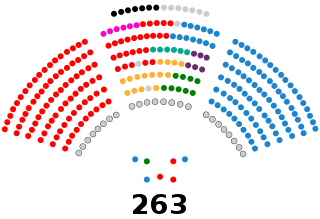
The Cortes Generales are the bicameral legislative chambers of Spain, consisting of the Congress of Deputies and the Senate.

The president of the Senate is the presiding officer of the Spanish Senate, the upper house of Spain's Cortes Generales. It is the fourth authority of the country after the Monarch, the Prime Minister and the President of the Congress of Deputies. The president is elected among and by the incumbent senators. When the president is unable to exercise power, vice presidents of the Senate exercise the powers of the Senate president.

The 1905 Spanish general election was held on Sunday, 10 September and on Sunday, 24 September 1905, to elect the 12th Cortes of the Kingdom of Spain in the Restoration period. All 404 seats in the Congress of Deputies were up for election, as well as 180 of 360 seats in the Senate.

Francesca Lluch Armengol Socias, known as Francina Armengol, is a Spanish politician from the Socialist Party of the Balearic Islands. She currently serves as president of the Congress of Deputies since 2023 and as member of the Congress of Deputies from the Balearic Islands since 2023.

The 16th National Congress of the People's Party was held in Valencia from 20 to 22 June 2008, to renovate the governing bodies of the People's Party (PP) and establish the party's main lines of action and strategy for the next leadership term. It saw Mariano Rajoy being re-elected unopposed for a second term as party president, with 84.2% of the delegate vote in the congress and 15.8% of blank ballots (409).
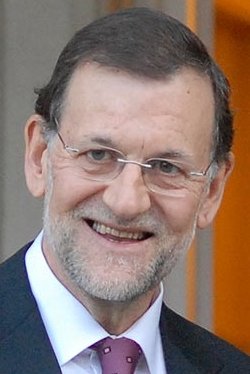
The 17th National Congress of the People's Party was held in Seville from 17 to 19 February 2012, to renovate the governing bodies of the People's Party (PP) and establish the party's main lines of action and strategy for the next leadership term. The congress slogan was "Committed to Spain", and it saw Mariano Rajoy, incumbent prime minister of Spain as a result of the PP victory at the 2011 Spanish general election, being re-elected unopposed for a third term as party president with 97.6% of the delegate vote in the congress and 2.4% of blank ballots (63).

The Bureaus of the Cortes Generales are the governing bodies of each House of the Cortes Generales, the legislative branch of Spain. The Bureaus are made up of the President or Speaker of the House, the Vice Presidents or Deputy Speakers and the Secretaries. Each Bureau is autonomously regulated by the standing orders of its House and its composition its not the same.
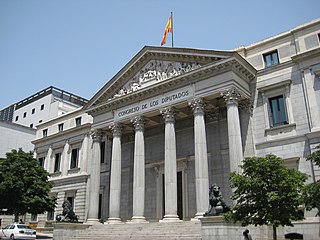
The 13th Congress of Deputies was a meeting of the Congress of Deputies, the lower house of the Spanish Cortes Generales, with the membership determined by the results of the general election held on 28 April 2019. The congress met for the first time on 21 May 2019 and was dissolved prematurely on 24 September 2019.

The Board of Spokespersons is a parliamentary body of the Cortes Generales mainly entrusted with the task of ordering the agenda of the Parliament. As a bicameral legislature, the Cortes Generales are formed by two houses, the Senate and the Congress of Deputies. The Board meets every week.
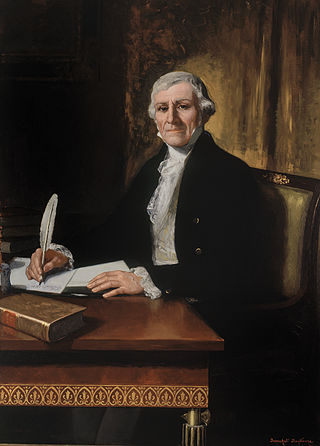
Ramón Lázaro de Dou y de Bassols was a Spanish professor and priest who was the first President of the Congress of Deputies after being elected by the majority of the Cortes of Cádiz. Lázaro was member of the Cortes representing the Principality of Catalonia from September 19, 1810 to January 15, 1814. He was noted for his pioneering work in the systematization of administrative law.

The 13th Cortes Generales was a meeting of the Cortes Generales, the national legislature of Spain, with the membership determined primarily by the results of the general election held on 28 April 2019. The cortes met for the first time on 21 May 2019 and was dissolved prematurely on 24 September 2019.

The 14th Cortes Generales is the current meeting of the Cortes Generales, the national legislature of Spain, with the membership determined primarily by the results of the general election held on 10 November 2019. The cortes met for the first time on 3 December 2019. According to the Constitution of Spain the maximum legislative term of the cortes is 4 years from the preceding election.

The 14th National Congress of the People's Party was held in Madrid from 25 to 27 January 2002, to renovate the governing bodies of the People's Party (PP) and establish the party's main lines of action and strategy for the next leadership term. It saw José María Aznar being re-elected unopposed for a fifth term as party president, with 99.6% of the delegate vote in the congress and 0.4% of blank ballots (10).

The 15th Cortes Generales were elected in the 2023 Spanish general election.
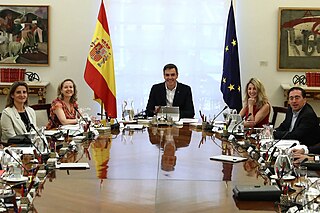
Attempts to form a government in Spain followed the Spanish general election of 23 July 2023, which failed to deliver an overall majority for any political party. As a result, the previous cabinet headed by Pedro Sánchez was formed to remain in a caretaker capacity until the election of a new government.

Isaura Leal Fernández is a Spanish politician member of the Spanish Socialist Workers Party who currently serves as a deputy and Second Secretary of the Congress of Deputies. Between 2018 and 2019 she was the second and last Government Commissioner in front of the Demographic Challenge of the Government of Spain.























